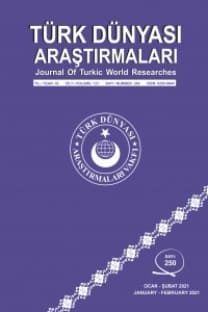Kazakistan vergi sistemine genel bir bakış
An overview of tax system In Kazakhstan
___
- BP, Statistical Review of World EnergyJune 2011, http://www.bp.com/ as- sets/bp_internet/globalbp/globalbp_uk_english/reports_and_publications/statisti cal_energy_review_2011/STAGING/local_assets/pdf/statistical_review_of_world_e nergy_full_report_2011.pdf (09/05/2012).
- China Ruoxi Du, Kazakhstan: a Weakening Fiscal Regime Under the New Ownership Structure?, http://fmso.leavenworth.army.mil/Collaboration/in- ternational/China/Kazakhstan_DU_intl.pdf, (02/05/2012).
- Deloitte, New Tax Code of the Republic of Kazakhstan Taxes on Property, Vehicle and Land, s. 1-3, 29 October 2008.
- Deloitte, New Tax Code of the Republic of Kazakhstan Value Added Tax and Excise Tax, s. 1-2, 29 October 2008.
- Edizdoğan, Nihat ve Çelikkaya, Ali, Vergilerin Ekonomik Analizi, Dora Yayıncılık, s. 239-246, 2010.
- Felipe, Jesus, Utsav, Kumar, The Role of Trade Facilitation in Central Asia: A Gravity Model, Asian Development BankWorking Paper No. 628, s. 1-42.
- IMF, Regional Economic Outlouk Middle East and Central Asia, http:// www.imf.org/external/pubs/ft/reo/2011/mcd/eng/pdf/mreo1011.pdf, 2011, (808/02/2012).
- IMF, Republic of Kazakhstan: Selected Issues, IMF Country Report No. 11/151, June 2011.
- KPMG, Corporate and Indirect Tax Surveys, http://www.kpmg.com/GR/ en/IssuesAndInsights/ArticlesPublications/Documents/Corporate-and-indi- rect-tax-survey-2011.pdf, 2011, (10/07/2012).
- Markov, Vsevolod and Bissengalieyva, Karlygash, Taxation in Kazakhs- tan, Mc Guire Woods Kazakhstan, February, 2009, http://www.hg.org/ar- ticle.asp?id=6046, (11/06/2012).
- PKF Worldwide Tax Guide 2011, http://www.pkf.com/media/387417/ pkf%20worldwide%20tax%20guide%202011%20v2.pdf (19/07/2012).
- Simon, Gyorgy, On the Customs Union of Belarus, Kazakhstan and Rus- sıa, Economıc Annals, Volume LV, No. 184, s. 7-28, January-March 2010.
- Stepanyan, Vahram, Reforming Tax Systems: Experience of the Baltics, Russia and Other Countries of the Former Soviet Union, IMF Working Paper, s. 173, 1-31, 2003.
- The Code of the Republic of Kazakhstan, No. 99, Dated December 10, 2008.
- Weinthalb, Erika, Pauline, Jones, Luong Energy wealth and tax reform in Russia and Kazakhstan, Resources Policy 27, s. 215-223, 2001.
- World Bank, Doing Business Economy Profile: Kazakhstan, 2012, http: //www.doingbusiness.org/~/media/fpdkm/doing%20business/documents/ profiles/country/KAZ.pdf (08.02.2012).
- WB, Assessment of Costs and Benefits of the Customs Union for Kazakhs- tan, Report No. 65977-KZ, January 3, 2012.
- WB, World Bank - Kazakhstan Partnership Program Snapshot September 2011, http://siteresources.worldbank.org/INTKAZAKHSTAN/Resources/KZ_ Snapshot_ENG_Sep2011.pdf (18/05/2012).
- WB, Running a Business in Kazakhstan, Enteprise Surveys Country Note Series, 63666, 2011, http://www-wds.worldbank.org/external/default/WDS ContentSer- ver/WDSP/IB/2011/08/10/000333038_20110810014956/Rendered/PDF/63664 0BRI0Runn00Box0361520B0PUBLIC0.pdf (17/05/2012).
- WB, Republic of Kazakhstan Tax Strategy Paper - Volume I, Report No. 36494-KZ, June 2008, http://siteresources.worldbank.org/INTKAZAKHS- TAN/147271-1090539544329/21824119/KZ_Tax_Report_Vol_1_19Jun08_ eng. pdf, (16/05/2012).
- WB, Republic of Kazakhstan Tax Administration Reform and Modernizati- on, Tax Strategy Paper, Volume II, June, 2008, http://www-wds.world- bank.org/external/default/WDSContentServer/WDSP/IB/2008/07/24/000 334955_20080724072405/Rendered/PDF/364940v20ESW0P1sclosed0July 02202008.pdf (25/05/2012).
- ISSN: 0255-0644
- Yayın Aralığı: 6
- Başlangıç: 1979
- Yayıncı: Türk Dünyası Araştırmaları Vakfı
Atatürk'ün bakış açısı çerçevesinde Türk-İran ilişkilerinin kısa bir değerlendirmesi
1917 Bolşevik ihtilâli'ndeki hayal kırıklığı ve Türkistan Türkleri
Dulkadır Devletine ait izler: Kayseri Sarıoğlan ve Sİvas Gemerek örneğiyle
Sevinç Çokum'un Hilal görününce romanında Kırım ve Kırım Türklerinin tarihi
Atatürk'ün yaşamında Rumeli'nin izlerini aramak
Rusya'nın Ermeni meselesindeki yeri ve önemi
Kastamonu mebûsu İsmail Mahir efendi'nin eğitime dair görüşleri
Kazakistan vergi sistemine genel bir bakış
Kutup(suz!) Dünyada Türkistan'ın jeopolitiği ve giderek artan önemi
